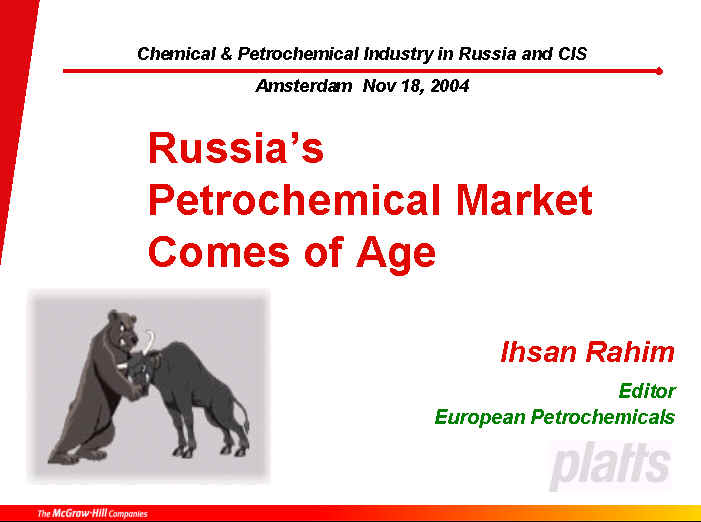
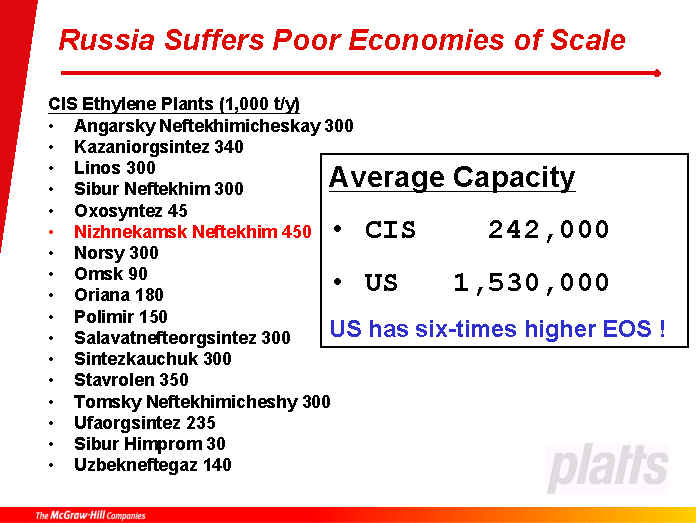
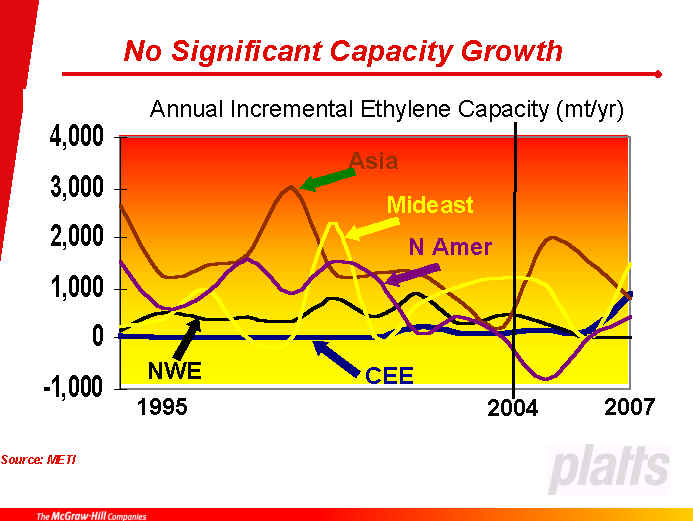

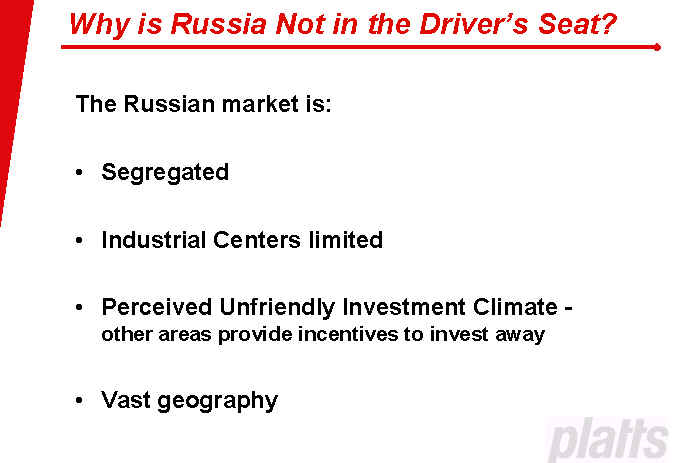
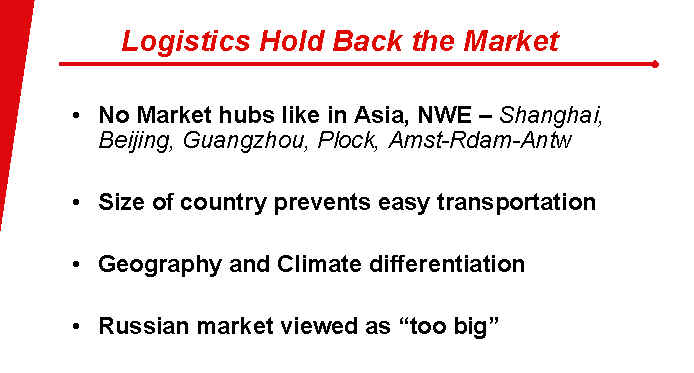
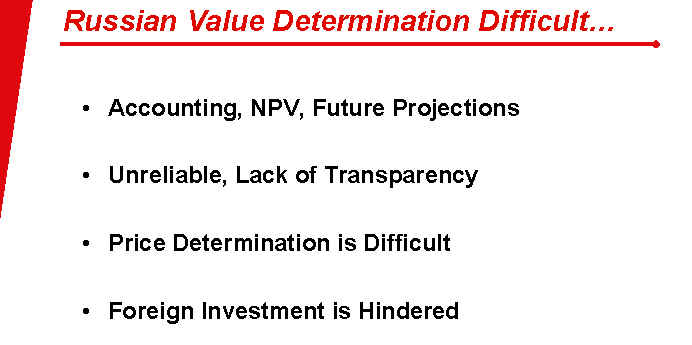
Russia/CIS
http://www.platts.com/Petrochemicals/Resources/Presentations/russia.ppt
 |
 |
| * Nuzhnekamskneftekhim to boost ethylene by 150,000 mt/yr to 600,000 mt/yr |
 |
 |
 |
 |
 |
日本経済新聞 2004/12/28 発表
化学プラント ロシアで200億円受注 東洋エンジなど高機能樹脂生産
東洋エンジニアリング、出光興産、旭化成ケミカルズはロシア化学大手のカザンオルグシンテツ(カザン市)から、高機能樹脂のポリカーボネート生産設備など化学プラントを受注した。受注額は約2億ドル(約200億円)で、2007年に完成予定。材料のビスフェノールAの設備も整備して一貫生産体制を築く。
モスクワ南東にあり、化学工場が集積しているタタルスタン共和国のカザン市に、既存の工場インフラを活用して最新設備を建設する。ビスフェノールAを年7万トン、ポリカーボネートを同6万5千トン生産する。
ビスフェノールAは出光興産、ポリカーボネートは旭化成ケミカルズが開発した生産技術を活用する。三井物産が全体を調整した。
ポリカーボネートはDVD(デジタル多用途ディスク)や電子機器の外枠、自動車部品など幅広く使われる。世界市場は年間200万トン規模とみられる。3社は追加受注を期待する。
カザンオルグシンテツは自社で生産しているアセトンやフェノールなどの原料を使ってポリカーボネートを生産、ロシア国内で販売するほか、欧州やアジアヘの輸出を検討している。
カザンオルグシンテツはロシアの化学大手で、エチレン、ポリエチレンなどを生産する。2003年の売上高は約3億6千万ドル。
2004/12/28
東洋エンジニアリング
ロシア初のビスフェノールA・ポリカーボネート設備を受注
http://www.toyo-eng.co.jp/jp/news/16/20041228.html
東洋エンジニアリング株式会社(TEC、取締役社長 山田豊)は、三井物産株式会社と協力して、ロシア連邦タタールスタン共和国のカザンオルグシンテツ社が、同共和国カザン市に建設を計画している、ロシア初となる年産70,000トンのビスフェノールA(BPA)生産設備及び年産65,000トンのポリカーボネート(PC)生産設備をこのたび受注致しました。TECの役務範囲は両設備の詳細設計及び機器調達で、プラントの完成は2007年を予定しています。本プロジェクトには、低い環境負荷と高い安全性に秀でた最新技術である、出光興産(株)のBPA技術と旭化成ケミカルズ(株)のPC技術が採用されています。三井物産(株)は、本プロジェクトの実現に向け、TEC及びライセンスを供与する出光興産㈱、旭化成ケミカルズ(株)と客先間のコーディネーションを行い、今回の早期受注に貢献してきました。
本プロジェクトは、自社で生産しているアセトン、フェノールを原料にBPAを生産し、最終製品のPCまで一貫して生産することにより、原料製品の高付加価値化を目的としています。またロシア国内でも急成長しているPCへの需要を満たすとともに、需要超過状態にあるヨーロッパ、アジアマーケットに輸出することが計画されています。ロシアはソ連崩壊後の混乱時期を脱し、高度経済成長軌道に乗り国内消費は年々上向きに転じており、石油化学製品や化学品に対する国内需要の高まりと共に、国内でのプラント需要も飛躍的に増大すると予測されています。当社は同国での長年にわたる豊富な経験を生かし、一層の受注拡大を期待しています。
<受注概要>
| ■客先 | : | カザンオルグシンテツ社(Kazanorgsintez;本社:カザン市)
(同国最大のポリエチレン製造会社でありボルガ河流域に位置する) |
| ■建設地 | ロシア連邦タタールスタン共和国カザン市
(モスクワ市の東方約1,000キロメートル) |
|
| ■対象設備 | 年産70,000トン・ビスフェノールA(BPA)製造設備 及び 年産65,000トン・ポリカーボネート(PC)製造設備 |
|
| ■役務範囲 | 詳細設計、機器調達 | |
| ■ライセンス | BPAは出光興産(株)、PCは旭化成ケミカルズ(株) | |
| ■プラント完成予定 2007年 | ||
| ■ | 受注の意義 | ||||
| 1 | ) | ロシア初のビスフェノールA及びポリカーボネート・プラントであり、低い環境負荷や安全性に秀でた日本企業の最新鋭技術が適用されます。 | |||
| 2 | ) | 今回のプロジェクトは、旧ソ連邦の官営工場から新しい経済体制での民間企業となった客先が、既存設備を有効に活用し同国の輸入代替や新規需要へ積極的に対応するものであり、今後同様な形で旧ソ連邦時代の遺産を有効に活用した新しいビジネス開拓が期待されます。 | |||
| 3 | ) | 今回の受注要因は、TECの豊富なモノマー及びポリマーの建設実績、ソ連時代を含め40年間以上継続して60件以上のプラントを建設した実績、長年蓄積されたロシア設計基準などの地域ノウハウ、更にプロジェクト実現に向けて発揮された三井物産のコーディネーション機能やロシア及びタタールスタンにおける地域展開力等の高い総合力などです。 | |||
Nizhnekamskneftekhim to produce
1-mil mt/yr polyethylene by 2008
Russia's Nizhnekamskneftekhim and Kazanorgsintez are to raise polyethylene output in the republic
of Tatarstan to 1-mil mt/yr by 2008, according to a government statement.
Currently, seven other companies produce a total of 1.35-mil
mt/yr. The republic's sales revenue from petrochemicals is
expected to rise to Rubles 42.43-bil ($1.45-bil) in 2008 from
Rubles 24.96-bil in 2003.
Nuzhnekamskneftekhim announced last week a $1.5-bil deal with
Korea's LG to build a 200,000 mt/yr PE plant and
a 40,000 mt/yr polystyrene plant in the republic. The company is
expected to boost ethylene ouput by 150,000 mt/yr to 600,000
mt/yr, while raising benzene output by 53,000
mt to 220,000 mt/yr.
Meanwhile, propylene
output is expected to rise by 55,000 mt/yr to 253,000 mt/yr, while butadiene would be up 10,000 mt/yr to
67,000 mt/yr. The existing PS
output would be doubled to produce 100,000 mt/yr. Other projects
include the construction of a new 120,000 mt/yr polypropylene
plant, which would be later expanded by another 60,000 mt/yr.
Ukraine's Naftogaz plans to buy
47.93% stake in petchem JV Lukor
Ukraine's national oil and gas company, Naftogaz, is planning to
buy out the government's 47.93% stake in Lukor, the country's
largest petrochemical joint venture, according to a government decree. The
decree did not stipulate the price of the transaction, but
requires Naftogaz to assume a Eur19.9-mil ($25.3-mil) debt owned
to a German bank by the JV. The development is a setback for
Lukoil, which owns a majority stake in Lukor, and has been
seeking to acquire more shares.
Lukor, the jv that was formed in December 2000 by LUKoil-Neftekhim and
Ukrainian petrochemical complex Oriana.
Lukor (former
Oriana Chemical Corporation) -
one of the largest Ukrainian chemical companies that produces
benzene, polyethylene, propylene, ethylene and other products of
petrochemistry. Currently Lukor is a joint venture of LUKOIL (Russia) and the
Ukrainian shareholders of the former Oriana Chemical Corporation.
Platts 2005/11/23
Kazakhstan to sign petrochemical complex deal by Dec 15
The Kazakhstan's government plans to sign the first agreement
with foreign companies to build petrochemical complexes by Dec 15
as the country aims at becoming a serious player on the world
market, Kazakhstan's prime minister Danial Akhmetov said
Wednesday, as reported by national Kazinform news agency.
The government plans to sign an agreement which is to allow the
country to develop [petrochemical] sector, Akhmetov said on the
sidelines of a petrochemical conference in Kazakhstan's capital
of Astana.
Kazakhstan plans to build two large petrochemical complexes at
the Tengiz and Kashagan fields to produce up to 2-mil mt of
petrochemicals. Investments in the projects are estimated at
around $7- to $8-bil. Of the total, the country plans to invest
some $500-mil "in the near future."
"The most perspective sector of petrochemicals for
Kazakhstan is gas processing. It is this sector to allow the
country to become a serious competitor to all world
companies," Akhmetov was quoted as saying.
Kazakhstan has set up several working groups, in particular with
Lukoil, which is to build a gas chemical complex near the
Khvalynskoye field in the Caspian Sea, Akhmetov said. The project
envisages processing of over 14-bil cu m/yr of gas at the field.
Akhmetov also mentioned LG and Shell, among other companies,
negotiating the issue with the government. Usage of advances
technologies are among Kazakhstan's main conditions for
participating in the projects, Akhmetov said.
The national KazMunaiGaz is to represent Kazakhstan in the
projects, where the government plans to hold at least a 50%
interest.
Kazakhstan plans to raise gas production to 1.2-trillion cf in
2005, up 65% from 720 Bcf last year, and to increase gas output
further to 1.66-tril cf by 2010, according to KazMunaiGaz.
Foster Wheeler Awarded
Detailed Feasibility Contract In The Republic Of Kazakhstan
http://www.corporate-ir.net/ireye/ir_site.zhtml?ticker=FWLT&script=417&layout=-6&item_id=796203
Foster Wheeler
Ltd.announced today that its Italian subsidiary Foster Wheeler
Italiana S.p.A. has been awarded a contract by KazMunaiGas
Exploration and Production (KMG EP) for a detailed feasibility
study for a new petrochemical complex and related facilities to
be built in several locations in Western Kazakhstan. KMG EP is
the state-owned oil and gas company of the Republic of
Kazakhstan. The terms of the award of the study, which will be
included in Foster Wheeler's fourth-quarter 2005 bookings, were
not disclosed.
The proposed facilities, for which the expected final total
investment cost is in excess of $4 billion, would be built in two
phases. Phase 1 would include a gas separation unit to be built
near the town of Kulsary to treat dry gas from the Tenghiz field and separate ethane and propane,
and a petrochemical complex to be built near the city of Atyrau to
process the ethane and propane and produce polyethylene and
polypropylene.
Phase 2 would include an additional gas separation unit to be
built in Karabatan to treat dry gas from the Kashagan field and expansion of the Atyrau
petrochemical complex. The final capacity of the Atyrau complex
would be up to 1,500,000 tons per year of
polyethylene and up to 450,000 tons per year of polypropylene.
“We
are delighted to have been selected by KMG EP and to have the
opportunity to participate in such a large and prestigious
investment that would contribute substantially to the Republic of
Kazakhstan's industrial development. This award reflects the
quality and the depth of our technical and project execution
expertise, and also our considerable petrochemicals and gas
processing experience,” said Giorgio Veronesi, project
director and executive sponsor of Foster Wheeler Italiana's
projects in the Commonwealth of Independent States (CIS).
“We
have selected Foster Wheeler Italiana after an international
competitive tender, in accordance with Kazakhstan State
purchasing rules. We were pleased with Foster Wheeler's tender:
its competitive pricing, aggressive schedule and its proposed
execution strategy for the study,” said Roustem Bekturov, deputy
general manager of KMG Exploration and Production.
The feasibility report is expected to be completed in the first
quarter of 2006. The facilities are expected to be mechanically
completed between 2009 and 2012, depending on the final selected
configuration and execution scheme.
Foster Wheeler Ltd. is a global company offering, through its
subsidiaries, a broad range of design, engineering, construction,
manufacturing, project development and management, research and
plant operation services. Foster Wheeler serves the refining,
upstream oil and gas, LNG and gas-to-liquids, petrochemicals,
chemicals, power, pharmaceuticals, biotechnology and healthcare
industries. The corporation is based in Hamilton, Bermuda, and
its operational headquarters are in Clinton, New Jersey, USA. For
more information about Foster Wheeler, visit our Web site at
http://www.fwc.com.
2006/3/31 Basell
Basell signs MoU with KazMunayGaz and SAT for petrochemical
complex in Kazakhstan
Basell signs memorandum of understanding with KazMunayGaz and SAT
for first integrated worldscale petrochemical complex in Western
Kazakhstan
Following a meeting with Daniyal Kenzhetayevich Akhmetov,
Kazakhstan’s Prime Minister, Basell has
signed a memorandum of understanding (MOU) with KazMunayGaz
Exploration & Production (KMG EP) and SAT & Company (SAT)
confirming their intention to construct and operate a new
petrochemical project in Kazakhstan.
The project is expected to include an ethane
extraction unit in Kulsary and an integrated
petrochemical complex in Atyrau. The planned petrochemical
complex includes a worldscale ethane cracker
and polyethylene
facilities, as well as a propane dehydrogenation unit and
polypropylene
facility. Start up is planned for 2010.
“The
signing of this MOU highlights the rapid progress achieved and
marks a key milestone in the preparation of this important
project,” said Volker Trautz, CEO of Basell,
who participated in the recent meeting with the Prime Minister. “When operational in 2010, this
facility will establish a new benchmark for the polyolefins
industry. The polypropylene and polyethylene units will use
Basell’s latest generation process
technologies, so manufacturing costs will be among the lowest in
the industry, while benefiting from a broad product capability.”
Trautz added, “They will also benefit from
advantaged feedstocks, since they will be integrated with local
gas supplies. As the leading polyolefins supplier worldwide and
the largest polyethylene producer in Europe, Basell will provide
sales and marketing support for the project.”
In addition to
providing technology and sales and marketing services, Basell
intends to participate directly as a shareholder in the project.
KazMunayGas (KMG) was founded in 2002 as a
result of the merger of CJSC National Oil Company Kazakhoil and
NC Oil and Gas Transportation. This state owned company was
created with the goal of developing Kazakhstan’s oil and gas resources. KMG EP is
the operating subsidiary responsible for exploration and
distribution of oil and gas. KMG is also a shareholder in
TengizChevrOil (TCO) and Agip KCO.
SAT is a privately owned, diversified
conglomerate with industrial, commercial and service activities.
Basell is the world's largest producer of polypropylene and
advanced polyolefin products, a leading supplier of polyethylene
and catalysts, and a global leader in the development and
licensing of polypropylene and polyethylene processes. Basell,
together with its joint ventures, has manufacturing facilities
around the world and sells products in more than 120 countries.
Additional information about Basell is available at
www.basell.com.
Platts 2006/6/15
Lukoil, Germany's Uhde agree to build PVC plant in Ukraine
Russia's Lukoil-Neftekhim and German engineering company Uhde
agreed to go ahead with construction of a new suspension PVC
production facility at Ukraine's largest petrochemical
company KarpatNaftoKhim. The agreement was reached at a
recent meeting of Lukoil-Neftekhim CEO Aleksey Smirnov and Klaus
Schneiders, chairman of Uhde's executive board, KarpatNaftoKhim's
press service said Thursday.
The two companies are now expected within weeks to sign the
contract to build the 300,000 mt/year PVC facility in
Kalush, the
company said. The new complex, worth $200 million, is expected to
be completed by 2009, the company said. "This would be the
first, modern, PVC production facility in Ukraine,"
KarpatNaftoKhim CEO Serhiy Chmykhalov said in a statement.
After the new facility is launched in operation, the company
plans to start massive exports of the produced commodity not only
to Eastern European countries, but also to Russia. "There is
no such plant in Russia and will not be in the coming years. We
should not only fill the domestic market, but also to expand on
markets of Russia, Hungary and Poland," Chmykhalov said.
The new facility would allow the company to use vinyl chloride
monomer that it produces as raw materials to produce PVC.
KarpatNaftoKhim, Ukraine's only producer of VCM, is currently
exporting most of its VCM to Russia, the European Union and
Turkey.
KarpatNaftoKhim, which is capable of producing about 370,000 mt of VCM annually, only produced 10,000 mt
of VCM in May due to weak demand. The company plans to boost VCM
production to 15,000 mt in June, according to the company.
KarpatNaftoKhim, which is a part of Lukoil-Neftekhim Group,
operates all production assets of the Kalush-based joint-venture
Lukor, the country's major producer of petrochemical products. Lukoil Chemical
BV, a subsidiary of Russian oil major Lukoil, owns 76% stake in
KarpatNaftoKhim, while the remaining 24% is owned by Lukor. Lukor itself is 52% owned by
Lukoil and 48% owned by the Ukrainian government, via Oriana, a
state petrochemical firm.
Foster Wheeler 2006/9/19 PE PP
Foster Wheeler Awarded Front-End Design for New Complex of
Refining and Petrochemical Plants in Tatarstan
Foster Wheeler Ltd. announced today that its Paris-based
subsidiary Foster Wheeler France S.A., part of its Global
Engineering and Construction Group, has been awarded the
front-end engineering design (FEED) by CJSC Nizhnekamsk
Refinery for
a new Complex of refining and petrochemical plants to be
constructed in Nizhnekamsk, in the Republic of
Tatarstan,
Russian Federation.
This award has been made within the framework of an existing
project management consultancy (PMC) contract awarded to Foster
Wheeler France by CJSC Nizhnekamsk Refinery in 2005. The terms of
the FEED award, which will be included in Foster Wheeler's
third-quarter 2006 bookings, were not disclosed.
The Complex consists of an oil refinery, aimed at processing
seven million tons of crude oil per year, a deep conversion plant
and a petrochemical plant. The oil processing part of the Complex
includes aromatics units and deep conversion section with a
fluidized catalytic cracker, a distillate hydrocracker, a delayed
coker and a gasification plant. The petrochemical part of the
Complex will include purified terephthalic acid,
polyethylene terephthalate, linear alkylbenzene and polypropylene
units, plus
the associated power generation facilities. The expected total
investment cost of the Complex will be in excess of three billion
US dollars. The current plan of CJSC Nizhnekamsk Refinery is to
complete the complex in three different phases between 2008 and
2010.
Foster Wheeler has to develop a complete FEED package, including
definition of scope and configuration for all of the new process
units, which is currently being undertaken by Foster Wheeler,
using the experience and expertise of its operations in Milan,
Paris, Reading and Moscow. The selection of licensors for the oil
processing and petrochemical plants of the Complex has been
completed by CJSC Nizhnekamsk Refinery with the support of Foster
Wheeler.
Foster Wheeler's Moscow office intends to supervise and
coordinate the FEED activities being undertaken by the Russian
Design Institute JSC VNIPIneft (Moscow) for the non-licensed
refinery units, including the atmospheric crude distillation and
the vacuum distillation units, as well as utilities and offsites.
"We are delighted to receive a further award for this major
complex in Tatarstan," said Umberto della Sala, chief
executive officer of Foster Wheeler's Global Engineering &
Construction Group. "This latest award recognizes the
excellent work already fulfilled by Foster Wheeler for CJSC
Nizhnekamsk Refinery and confirms our commitment to delivering
successful projects in the Russian Federation. Working on the
project of Nizhnekamsk Complex we are using the considerable
refining and petrochemical strengths and skills of three of our
major engineering centers, and also our recently established
Moscow operating office."
"We have been working successfully with Foster Wheeler since
2001 and it is no surprise that we selected them as a Project
Management Consultant for our Project," declared Khamza A.
Bagmanov, general director of CJSC Nizhnekamsk Refinery. "We
are pleased with Foster Wheeler's professionalism, responsiveness
to our needs and its capability to mobilize highly qualified
resources from its European offices as well as from its Moscow
operations."
Russia's Rosneft mulls petchem complex at Komsomolsk refinery
Russia's state-run Rosneft is
considering building a petrochemical complex at the Komsomolsk
refinery
in Far East Russia, to process around 1-million mt of naphtha,
Valery Yezhov, the refinery's general director said Thursday.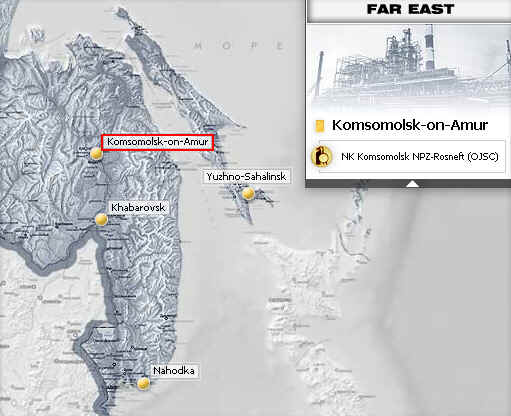
The naphtha is currently exported to China, but the company was
hoping to produce olefins and other petrochemical products
instead. "We are looking into a possibility to produce some 500,000mt
of ethylene and over 200,000mt of propylene to process our naphtha
rather than export it," Yezhov said.
The plan was one of several possible options for the plant's
development, he said, adding that there were also possibilities
to produce methanol or other products at the site. "But,
this seems to be the most effective [option] at the moment,"
he said.
Rosneft's investment committee was to make a decision on the
issue by the end of the year. Should the committee decide to go
ahead with the petrochemical project, the complex could be built
by 2009-2010, Yezhov said.
http://www.rosneft.com/english/about_rosneft/
Rosneft is a vertically-integrated Russian oil and gas company with upstream and downstream operations in each of Russia's oil-producing regions. Headquartered in Moscow, compared to public companies it is the world's second largest company in terms of proved SPE oil reserves and Russia's second-largest hydrocarbon producer.
Rosneft operates ten oil and gas producing enterprises across Russia and is involved in over ten world-class exploration projects. In addition to its strong upstream operations, the Company also owns two refineries, which have a combined capacity of 10 million tons per year, as well as four main oil export terminals and a nationwide network of over 600 service stations.
Topsoe selected for JSC
Shchekinoazot
New 450,000 MTPY methanol plant
project in Russia
Topsøe has recently concluded a
contract with JSC Shchekinoazot, Russia for the supply of its methanol
technology for a new 450,000 MTPY methanol plant to be located at JSC
Shchekinoazot existing site in Shchekino, Tula.
The methanol plant will be based on Topsøe’s two-step reforming process,
methanol synthesis and methanol distillation. The scope of Topsøe’s supply comprises license, basic
engineering, proprietary equipment and catalysts.
“The
selection of our methanol technology is based on the recognition
of our extensive experience with the technology, and I am
personally very pleased that we have entered into collaboration
with an esteemed company like JSC Shchekinoazot for this very
important project,” says Haldor Topsøe, Chairman of Haldor Topsøe A/S.
Boris Sokol, President of JSC Shchekinoazot added: “The experience of our partner, a
leading world technology company, will enable JSC Schekinoazot to
build a modern, competitive plant and to become the technology
leader on the Russian methanol market.“
The new methanol
plant is scheduled for start-up by the end of 2009. After the
start-up of the new methanol plant the annual production of
methanol at JSC Shchekinoazot site will reach 600,000
MTPY.
Topsoe specialises in the production of heterogeneous catalysts 不均一触媒 and the design of process plants based on catalytic processes. Focus areas include the fertiliser industry, the chemical and petrochemical industries, and the energy sector (refineries and power plants).
We are at present 1600 employees worldwide including subsidiaries, branch offices, and representative offices. The headquarters are located in Lyngby, a northern suburb of Copenhagen, Denmark. Manufacture of catalysts and certain specialised equipment is carried out in Frederikssund, Denmark and in Houston, Texas, U.S.A.
2007/8/21 Platts
Russian Nikochem to decide on $3 billion petchem unit by year-end
Russian caustic soda and polyvinylchloride producer, Nikochem, is
considering building a $3 billion petrochemical complex in the
Volgograd region of central Russia, the company's general
director Eldor Azizov said Tuesday.
The company expects to start construction of the complex which
will produce 500,000 mt/year of
polyvinylchloride, 450,000 mt/year of polyethylene and 400,000
mt/year of polypropylene by the end of 2008, he said.
"If we start the construction in late 2008, the complex will
be commissioned in 2012," Azizov added. Nikocehm expects to
have made a decision by the end of the year.
The new unit would be built on the site of sodium chloride
producer Kaustic, which is a part of Nikochem and located near
Lukoil's refinery.
One of the main issues to be resolved to give a kick-start for
the project is feedstock sources, Azizov said.
"The project will demand some 2 million mt/year of raw
materials and we are currently negotiating a long-term contract
on supplies of 1.5 million mt/year of gasoil from Lukoil's
refinery, which is located 500 meters away [from the would-be
petrochemical unit]," Azizov said.
The company is also negotiating with Kazakhstan for supplies of
some 500,000 mt/year of LPG from the northern Caspian region,
among other options, he said, declining to elaborate.
Gasoil supplies would be more expensive than that of LPGs or
Naphtha but Nikochem hopes to compensate the higher price with
lower expenditure on logistics, Azizov said. Lukoil's refinery in
Volgograd expects to produce some 4.5 million mt/year of gasoil
in the near future, half of which, according to Azizov, will be
exported.
The petrochemical complex will be financed with private money,
Azizov said, denying reports in the local media that the project
would require federal funding.
Nikochem has already reached a preliminary agreement with
Russia's VTB bank that it, "would become a financial partner
and consultant" in the project, said Sergei Belichenko, head
of Nikos group, which owns Nikochem.
Nikochem
is also negotiating with US Dow Chemical and Lukoil's
petrochemical arm Lukoil-Neftekhim their possible participation in
the project, Azizov said, adding that the outcome of the talks
would be clear only after all the project's details were
finalized.
Dow Chemical will take part in the project, which is still in the
discussion stage, "if the conditions meet our
expectations," Dow Chemical Russia general director Adriaan
van den Berge said in an interview with Russia's RBC daily,
published Monday.
Lukoil-Neftekhim and Dow Chemical were not available for
immediate comment.
Nikochem unites sodium chloride producer Kaustic, PVC producer
Plastkard, PVC compound producer Plastkab and household chemistry
producer European Chemical Company.
The group produces some 240,000 mt/year of caustic soda,
90,000 mt/year pf PVC, 110,000 mt/year of graining caustic soda, among other products.
Kazakhstan, Chevron to agree on Tengiz gas price for petchem unit
KazMunaiGaz
expects
within a month to agree with TengizChevroil--the Chevron-led
consortium developing
the giant Tengiz field in western Kazakhstan--on the price of gas
deliveries to a new planned petrochemical complex, a source close to the project
told Platts Tuesday.
"I think they will agree on the price within a month,"
the source said.
As soon as the price is agreed, the final decision on the
construction of the petrochemical complex will be taken, he said.
The parties are negotiating deliveries of some 7 billion cu
m/year of gas from Tengiz, he said.
KazMunaiGaz
together with private Kazakhstan's company SAT, which is operator of the
petrochemical project, plans to build the facility with
throughput ethylene capacity of 1.2 million
mt/year.
The unit is to produce 800,000 mt/year of polyethylene,
and 400,000 mt/year of polypropylene.
The construction of the $5 billion project is expected to start
in 2009, with the commissioning planned for late 2012.
During the first stage of the project gas from Tengiz will be the
only source of feedstock for the petrochemical unit. At the
second stage, the expansion is possible taking into account
future deliveries from Kashagan, another huge field in
Kazakhstan. The start-up of production at the Kashagan field,
operated by Italy's Eni, has been repeatedly delayed and is now
expected after 2012.
LOOKS FOR FOREIGN PARTNER
Kazakhstan
Petrochemical Industries, a 50:50 joint venture between
KazMunaiGaz and SAT, operating
the petrochemical project, is currently negotiating with major
foreign companies over their possible participation in the
project, the source said.
"They are looking for a strategic investor which will bring
into the project its own technology, access to market, and
finance," he said.
He mentioned Basell and Dow Chemical and "some Chinese
companies" among the firms with whom the talks are under
way.
Currently KPI plans to invest 30% of its own funds in the project
with the remaining 70% to come from other sources.
Ukraine's major petchem firm starts building new PVC plant
Ukraine's biggest
petrochemical company, KarpatNaftoKhim, started construction of a
new polyvinyl-chloride (PVC) production facility in Kalush, the
company's press service said Friday.
The new 300,000 metric tons/year PVC facility, worth about $210
million, would be the first in Ukraine and the most advanced such
facility in Eastern Europe, the company said.
The Kalush-based KarpatNaftoKhim is majority owned by
Lukoil-Neftekhim, a petrochemical arm of Russian oil major
Lukoil.
The new facility, after it is launched into operation in 2009,
will improve environmental conditions in the region as it will be
using vinyl-chloride monomer (VCM) as raw material for PVC
production, instead of shipping the raw material for exports, the
company said.
KarpatNaftoKhim is the only producer of VCM in Ukraine, but also
the country's major producer of polyethylene, ethylene,
propylene, caustic soda and other petrochemical products. The
company is capable of producing about 370,000 mt of VCM/year.
KarpatNaftoKhim plans to increase VCM output by 15.1%
year-on-year to 197,400 mt in 2008, up from 171,500 mt produced
in 2007.
平成20年4月15日
東洋エンジニアリング
ロシア向けエチルベンゼン(EB)生産設備を受注
東洋エンジニアリング株式会社(TEC、取締役社長
山田 豊)は、伊藤忠商事株式会社(取締役社長
小林栄三)と協力し、当社の韓国現地法人であるトーヨーコリア社(Toyo-Korea、取締役社長 菅屋直樹)とともに、ロシア連邦シブール社がペルミ市に建設を計画する22万トンのエチルベンゼン(EB)生産設備をこのたび受注いたしました。本プロジェクトには米バジャー社の技術が採用されており、Toyo-KoreaとTECは基本設計、詳細設計、機器調達及び工事テクニカルアドバイザリーサービスを実施し、プラントの完成は2010年末を予定しています。
<受注概要>
■客先
ロシア連邦シブール社(ガスプロム社の化学・石化分野子会社)
シブール社は、同国での有機合成分野でのマーケット・シェア拡大並びに国外への輸出拡大を目指して、これ以外にも数多くの大型投資を計画中。
■受注者 Toyo-Korea
■役務内容
基本設計、詳細設計、機器調達及び工事テクニカルアドバイザリーサービス
-Toyo-Koreaがメインコントラクター、TECはToyo-Koreaのサブコントラクター
■対象設備 年産22万トンのエチルベンゼン生産設備(スチレンの原料)
■建設地 ロシア連邦、ペルミ市
■摘要技術 米バジャー社の技術
■プラント完成予想 2010年末
■受注の意義
- シブール社が同時に計画しているエチレン増産、スチレンモノマー増産、発泡ポリスチレン新設とともにポリマーコンプレックスの一翼を担う。
- ガスプロムグループからの初の受注。同グループでは、今後ガス高付加価値戦略に沿って下流である石化分野への投資が期待される。
- TECとToyo-Koreaが共同で受注した「Global Toyo」(*)案件
(*)Global Toyo:Toyoという名前の下で、市場・顧客に密着しながらTECとグループ各社が相互に連携し、かつ自立的に活動する体制
- TECはソ連時代を含め40年間以上継続して60基以上のプラントを建設した実績や、長年蓄積されたロシア設計基準などの豊富な地域ノウハウを、グループ会社と共有し“Global Toyo”としてロシアでの受注拡大の突破口となる案件。
2008/4/24 Reuters
UC RUSAL buys 25 pct of Russian miner Norilsk
United Company RUSAL completed the purchase of a one-quarter
stake in Norilsk Nickel on Thursday, paving the way for
the creation of a Russian mining giant headed by the country's
richest man, Oleg Deripaska.
The deal brings the high-profile "divorce" between
Norilsk co-owners Mikhail Prokhorov and Vladimir Potanin a step
closer to conclusion, but could ignite another struggle between
Russian billionaires for control of the world's largest nickel
miner.
"Deripaska won't want one of his legs stuck in Norilsk
Nickel. He will want to have more," said UralSib mining
analyst Kirill Chuiko. "After the first step, a second step
is needed."
UC RUSAL and Prokhorov's investment vehicle, Onexim Group, issued
a joint statement saying Onexim would receive an unspecified cash
amount plus a 14 percent stake in UC RUSAL in exchange for its
stake in Norilsk.
The deal gives UC RUSAL and its majority owner Deripaska control
of a 25 percent-plus-one-share stake in Norilsk -- enough to
block any major board decisions.
Norilsk's Moscow-traded stock closed down 3.5 percent at 6,555.1
roubles, a steeper fall than the 1.1 percent drop in the MICEX
bourse's metals and mining index .MCXMM.
UC RUSAL and Onexim said the cash component of the deal was
supported by a syndicated loan provided by ABN AMRO, Barclays
Capital, BNP Paribas, Calyon, Credit Suisse, Goldman Sachs, ING,
Merrill Lynch, Morgan Stanley, Natixis and UniCredit Group.
Neither side confirmed the size of the loan. Banking sources have
told Reuters UC RUSAL has arranged a $4.5 billion syndicated loan
to back its acquisition of a stake in Norilsk.
Norilsk has a market capitalisation of $55.7 billion. A 25
percent stake in theory would cost $13.9 billion, but in Russia
"blocking stakes" of 25 percent plus a share are
usually valued at a premium. The cash amount will also be less as
Prokhorov is receiving a share in unlisted UC RUSAL.
GROWTH POTENTIAL
UC RUSAL Chief Executive Alexander Bulygin said the deal
"laid a solid foundation for the development of UC RUSAL as
a diversified metals and mining corporation with huge growth
potential".
In a separate statement, Norilsk Chief Executive Denis Morozov
welcomed the arrival of UC RUSAL, the world's largest aluminium
producer, as a large shareholder.
"The acquisition of such a significant stake demonstrates
once again the investment appeal and strong prospects for the
further growth of Norilsk Nickel," Morozov said.
Any further ambitions UC RUSAL might have, however, will depend
to a large extent on Vladimir Potanin, now the single largest
shareholder in Norilsk Nickel.
Potanin met outgoing Russian President Vladimir Putin on
Thursday, a Kremlin spokesman said. He declined to say if the
meeting was linked to the Norilsk stake sale, and Potanin's
Interros Group declined any comment on Thursday's deal.
Norilsk Nickel's management is also in talks about a possible
merger with Metalloinvest, the iron ore and steel firm founded by
Uzbek-born billionaire Alisher Usmanov.
"Talks between Metalloinvest and Norilsk Nickel continue.
The possibility of a merger will depend on the decision of the
majority of shareholders in both companies and on the market
estimate of their value," Metalloinvest said in a statement.
HIGHER STAKE
Prokhorov's 14 percent stake in UC RUSAL is higher than the 11
percent agreed when the companies first struck the pact.
Explaining the difference, a source close to the deal said the
original pact contained a clause stating UC RUSAL would have to
pay compensation to Onexim should it pay a higher price for any
shares it might subsequently acquire in Norilsk.
"This clause is no longer there, so the stake was raised to
14 percent," the source told Reuters on condition of
anonymity.
Deripaska and Bulygin are two of four candidates nominated to
Norilsk's board. The others are shareholder Viktor Vekselberg and
independent director Tye Burt. Norilsk shareholders will consider
their election at their annual meeting in June.
Onexim will also gain representation on UC RUSAL's board.
Prokhorov and Potanin, ranked fifth and sixth on Forbes
magazine's list of richest Russians, formed one of the country's
most successful business partnerships in the 1990s but said in
January 2007 they planned to pursue different interests.
Fifteen months later, Potanin said on April 17 they had
"managed to overcome all differences and come to a mutually
beneficial agreement".
This agreement involved Potanin buying his partner out of
KM-Invest, a jointly controlled investment vehicle that holds an
8 percent stake in Norilsk. Industry sources say this took
Potanin's stake in Norilsk to nearly 30 percent.